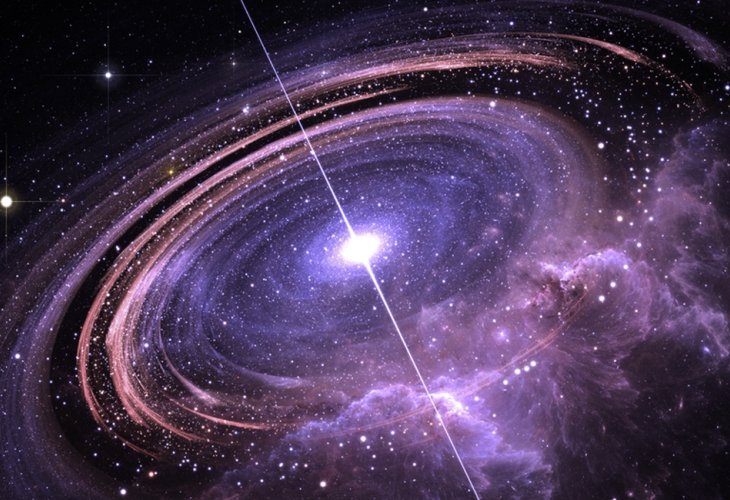Faith
The Universe Is Not Random: Scientific Proof of Order, Law, and a Creator
From the precision of natural laws to the limits of multiverse theories, the universe points to a purposeful Creator
 (Photo: shutterstock)
(Photo: shutterstock)
In the previous article, we learned that the universe is in fact a one-time creation. Its laws of nature were set from the very beginning and never change — as it is written: “He established a law that shall not pass” (Tehillim 148:6).
The universe can be compared to a computer program built from lines of code: even when new images appear on the screen, they are nothing more than exact expressions of the code written from the start. The “lines of code” of our universe are its laws of nature. Everything we observe — whether a vast galaxy, a single star, or even a tiny bond between two atoms, is simply a direct result of these laws. Even the most complex chain reactions are inevitable outcomes of laws that must unfold with absolute precision, bounded by space and time.
Every Detail Was Programmed from the Beginning
Theoretically, if a scientist could gather every piece of material data, he could predict from the beginning of the universe when and where a stone would fall, or in which cave gold and other metals would form. This is because the entire periodic table of elements was already encoded from the universe’s earliest moment, before molecules even existed. Natural laws guided particles into atoms, and atoms into molecules. Everything has always followed the original “program” of the Supreme Architect.
No Other Possibilities Exist
There are no “other options” in our universe. From its inception, it has been governed by precise, mathematical, unchanging laws that compel matter to behave exactly as it does.
The universe is not like a card game, a lottery, or the roll of dice. It is a system fixed and coded from the start. Randomness was never part of it.
This is therefore not a question of odds — “one in a billion” or “one in a trillion.” The question is binary: either 1 or 0. Either there is creation, or there is not. Either the universe has laws, or it does not. These are the only possibilities.
Because we clearly see creation and the presence of natural law, we have direct scientific evidence for an intelligent Designer and Lawgiver.
The Multiverse: A Science Fiction Idea, Not Science
Some speculate about imaginary “other universes,” an idea popular in science fiction under the name multiverse. In fact, this concept is not accepted in mainstream physics or astronomy, because no direct or indirect evidence supports it. It is essentially an unproven fantasy.
Professor George Ellis writes: “No possible astronomical observation can ever see those other universes. The claim that multiverses exist is therefore not based on observational evidence. Even if other universes did exist, they would not explain the great mysteries of nature.” [George F. R. Ellis, Does the Multiverse Really Exist?, Scientific American]
Even belief in parallel universes does not answer the central question of what determines the order and law within each universe? Every imagined universe would also require specific laws to govern its existence. Who is the ultimate “cause of causes” that creates universes and sustains them with such laws?
Law Implies a Lawgiver
The Creator of the universe is not random but intentional: “He did not create it for chaos; He formed it to be inhabited” (Yeshayahu 45:18). Without intention, there could be no order, no mathematics, no design — only chaos, scattered particles, and disorder.
By definition, “law” implies a legislator. Randomness, on the other hand, is simply lawlessness. In a universe ruled by clear and consistent laws, there is no such thing as pure chance.
Even One Atom Is Proof of Design
Just as every motion in our universe is compelled by natural law, so too would any imagined universe require laws. Without a lawgiver behind reality itself, no universe would contain mathematics, design, or order of any kind.
One orderly universe is enough. The existence of even a single natural law in one atom proves the presence of a Designer and Lawgiver behind all of reality.
As Professor David Weiss, physician and cancer researcher, once said: “Science only deals with what exists. Where did it all come from in the first place? Science doesn’t address that. As a scientist, I look for order in the world, whether in immunology or cell biology. To explain not only the creation of the world but also why this atom or molecule exists in an orderly way instead of exploding into chaos — I must assume the existence of the great Architect.” (Haaretz, July 26, 1996)
Even one law in one atom testifies to a “first cause” that is not random.
The Unavoidable Conclusion
No matter how far our imagination goes, we cannot escape the conclusion that the laws of the universe — or of any possible universe, point to an intelligent, intentional Lawgiver. His design had to be carried out exactly as He willed it, not by accident, and not by chance.
“He who planted the ear, shall He not hear? He who formed the eye, shall He not see?” (Tehillim 94:9). The One who created law is the Lawgiver. The One who designed the universe is wiser than all wisdom.

